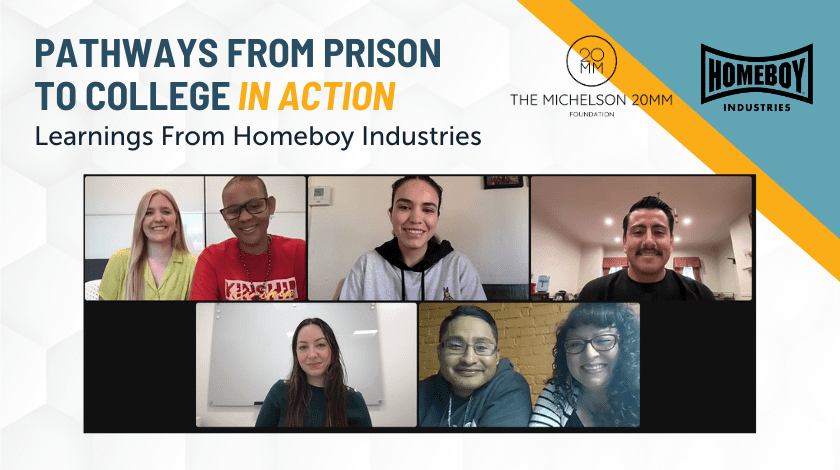News and Announcements
Empowering Futures: How Homeboy Industries Provides Pathways to College Education
Published Date
- December 15, 2023

By Kenia Miranda Verdugo
Last week, we kicked off the webinar series “Pathways from Prison to College: California’s Best Practices in Action,” through which we are highlighting remarkable organizations across the state who are implementing “California’s Best Practices: Pathways From Prison to College.” The series began with California’s own Homeboy Industries.
In a world where second chances are not always readily available, Homeboy Industries stands as a beacon of hope and transformation for formerly gang-involved and previously incarcerated people. At the heart of this transformative organization lies the Homeboy Industries Education Program Pathways to College, a crucial initiative that seeks to break the cycle of recidivism by providing educational services to those seeking redemption and a chance at a brighter future.
As Jarvis Thompson shared with KCal news, two years after he was in county jail fighting attempted murder after a childhood of gang involvement, he became involved with Homeboy Industries. “They wanted me to drive, they wanted me to be successful…The staff and volunteers at Homeboy never gave up on that.”
Education as a Pathway to Self-Sufficiency and Self-Worth
Formerly incarcerated individuals often face numerous barriers as they reenter society. Stigma, limited employment opportunities, and a lack of support systems can create an environment that perpetuates a cycle of entering the justice system. Recognizing the pressing need to address these challenges, Homeboy Industries places a strong emphasis on education as a key component of rehabilitation. Through education, justice-impacted individuals can forge a pathway to self-sufficiency.
Recognizing this, Homeboy has a fridge for report cards. After a member said, “I always wanted my report card hung on my mom’s fridge when I was growing up,” the team realized the importance of celebrating these moments of self-worth.
Additionally, education becomes a means of personal empowerment, fostering a belief in one’s ability to contribute positively to society. Homeboy Industries believes that while academic knowledge can be empowering, one’s experiential knowledge can be equally important. In this case, we are all students and teachers, which helps boost confidence in one’s lived experience.
Education as a Gateway to Employment
Education is a gateway to expanded employment opportunities. Many employers are biased against individuals with a criminal record, which can be mitigated by a solid educational foundation. Homeboy Industries collaborates with partners to create training programs in alignment with market demands, ensuring that program participants are equipped with skills that are relevant and in demand.
California’s Best Practices: Pathways From Prison to College pushes for academic and career counselors to evaluate transcripts, provide comprehensive educational plans, and advise about transfer pathways, academic majors, and career fields. We recognize that education must lead into career opportunities in order to generate wealth and ultimately reduce recidivism.
“We know that education reduces recidivism and impacts intergenerational cycles,” Brittany Morton shared. “With a GED, the recidivism rates go from 70% to 54%; with an Associate of Arts degree, 70%, which is the average, to 13%; and with a bachelor’s 5%—a master’s and beyond it’s ostensibly 0%.” As the Homeboy team says, education is a tool that can “create change…in individuals’ lives and in our society and communities.”
The Proof Is in the Transformation
The success stories emerging from Homeboy Industries showcase the transformative power of education. Graduates of the program have gone on to secure meaningful employment, rebuild relationships with their families, and become contributing members of society. These success stories serve as testimonials to the importance of investing in education as a means of rehabilitation.
As Edin Madrid recounted, “I went from being undocumented, from wanting to work under the table to realizing that I could apply to different colleges…I could apply to UCs, I could apply to Cal States, I could get scholarships, I could get financial aid, I could get my rent paid, and then I could do so much with education and that’s what the power of information did to me.”
The Homeboy Industries Education Program stands as a testament to the belief that everyone deserves a chance at an education. The ripple effect of education extends far beyond the individual as it positively impacts families, neighborhoods, and society. As we continue to advocate for criminal justice reform, it is essential to recognize the critical role that education plays in breaking the chains of incarceration and fostering a future filled with hope and opportunity.
Michelson 20MM is a private, nonprofit foundation working toward equity for underserved and historically underrepresented communities by expanding access to educational and employment opportunities, increasing affordability of educational programs, and ensuring the necessary supports are in place for individuals to thrive. To do so, we work in the following verticals: Digital Equity, Intellectual Property, Smart Justice, Student Basic Needs, and Open Educational Resources (OER). Co-chaired and funded by Alya and Gary Michelson, Michelson 20MM is part of the Michelson Philanthropies network of foundations.
To sign up for our newsletter, click here.